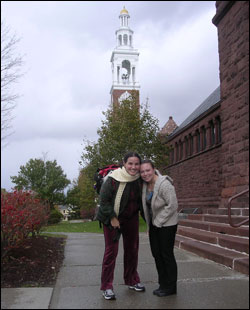Journalism Graduate Students Take Advantage of Opportunities at Recent Society of Environmental Journalists Conference
Columbia, Mo. (Dec. 7, 2006) — Opportunity is epidemic for graduate students at the Missouri School of Journalism. The symptoms can be subtle (networking) or obvious (e-mails), but the variables inevitably line up, and the students have an infectious urge to participate in career-building activities.
That’s what happened to graduate students Rebecca Townsend and Traci Angel, who found themselves with Professor Bill Allen amid almost 700 environmental writers at the Society of Environmental Journalists 16th annual conference in Burlington, Vt., earlier this fall.
The five-day conference pulled the trio away from the semester’s midterm crunch, but that didn’t mean they were slacking; on the contrary. They took the challenge of covering six of the meeting’s major events for the SEJ Web site, combining for four stories that anchored the society’s official news report. They still had plenty of time to attend more of the meeting’s nearly 100 activities and programs and rub shoulders with such environment beat leaders as 2006 Pulitzer winner Mark Schleifstein of the New Orleans (La.) Times-Picayune, Andrew Revkin of The New York Times, editor Jim Motavalli of E Magazine and Bill McKibben, author of “The End of Nature.”

Allen served as editor for Angel and Townsend’s stories, which included coverage of a keynote speech by Ben Cohen, co-founder of Ben & Jerry’s Ice Cream, who discussed the company’s eco-practices; a report from conference field trips; and coverage of plenary panels, including “Government Secrecy: What We Don’t Know Can’t…” a freedom of information panel moderated by Geneva Overholser, the School’s Curtis B. Hurley Chair in Public Affairs Reporting.
One of the most memorable events for Townsend, Angel and Allen was the awards ceremony, which highlighted SEJ’s notable environmental stories in all media.
“It’s the kind of journalism that gets recognized by peers to be the best,” Allen said.
Other panels and discussions gave the students insight on how professionals are confronting editors and conceiving stories about volatile topics such as climate change, pollution and agricultural practices. Meanwhile, at coffees, receptions and other social events, the MU students found experienced environmental journalists interested in helping newcomers develop the critical skills necessary for this kind of complex reporting.
“The best part was being able to experience a community of high-level journalists who are telling meaningful stories about the environment,” Townsend said. “I didn’t meet anyone who, because they worked for the Boston Globe or the New York Times, wouldn’t talk to a student.”
For both Townsend and Angel, the conference reaffirmed their interest in environmental and science journalism.
Townsend covered agriculture in Indiana for six years before starting graduate school during the winter 2006 semester. She is focusing on investigative, computer-assisted reporting to strengthen her coverage of environmental issues.
Angel had nine years of experience at various weekly and daily newspapers, The Associated Press and St. Louis magazine when she joined the School as a Knight Fellow for the 2005-06 academic year. Originally a biology major in college, Angel turned her attention to journalism, earning bachelor’s degrees in communication and Spanish at St. Louis University.
“Having some professional experience has really helped me make the practical application to the journalism theory courses such as Mass Media Seminar,” Angel said.
Angel and Townsend plan to graduate in December 2007 and pursue science and environmental reporting careers.
Allen, a veteran of the conference, joined the MU faculty in 2004 after 25 years as a journalist specializing in science, environment and medical reporting. He leads the agricultural journalism program in the College of Agriculture, Food and Natural Resources and is on the adjunct faculty of the Missouri School of Journalism. He teaches “Field Reporting in Food and Natural Resources” and “Writing about Biotechnology” and is developing a course on environmental reporting. The SEJ trip is set up as an optional one-hour course, as is a spring trip to the Platte River Valley in Nebraska to cover the Sandhill crane migration.
Allen said the best part of the meeting for him was helping Townsend and Angel navigate the events and extensive schedule and watching them learn how to “drink from the fire hose that is the SEJ meeting.”
“My highlight was seeing our bright students survive and thrive at one of the most intense journalism conferences for five straight days,” he said.
Angel credits her experience to an e-mail nudge from Allen and a tip from William Zinsser’s classic “On Writing Well,” a book she learned about in Jacqui Banaszynski‘s intermediate writing course. Banaszynski is the Knight Chair at the School and head of the Center for Editing.
“As a nonfiction writer you must get on the plane,” Zinsser counsels in one chapter. “If a subject interests you, go after it, even if it’s in the next county or the next state or the next country. It’s not going to come looking for you.”
Angel took the advice.
“I got on the plane. I met incredible people who are reporting on important environmental issues, and the powerful stories they had to share were inspiring,” she said. “The experience put graduate school in perspective for me.”
Read MU students’ conference coverage and more at the SEJ 16th Annual Conference Web site; look for these stories:
- “Lunch Plenary: An Appeal to Cover Government Secrecy”
- “Opening Plenary Addresses Whether Big Business Is Going Green”
- “From Camel’s Hump to Cow Power: SEJ Tours Probe the Issues”
- “Keynote Speaker Ben Cohen Mixes Cookies and Ice Cream”
Updated: April 15, 2020